My Maidan: One Journalist's Story
When journalist Emine Ziyatdinova, a Crimean Tatar, returned to Ukraine earlier this year, she found herself covering a conflict that left one of her friends dead and forced her to conceal her identity. "I loved Ukraine," she said. "But I don't anymore." A Q&A with Alan Chin.
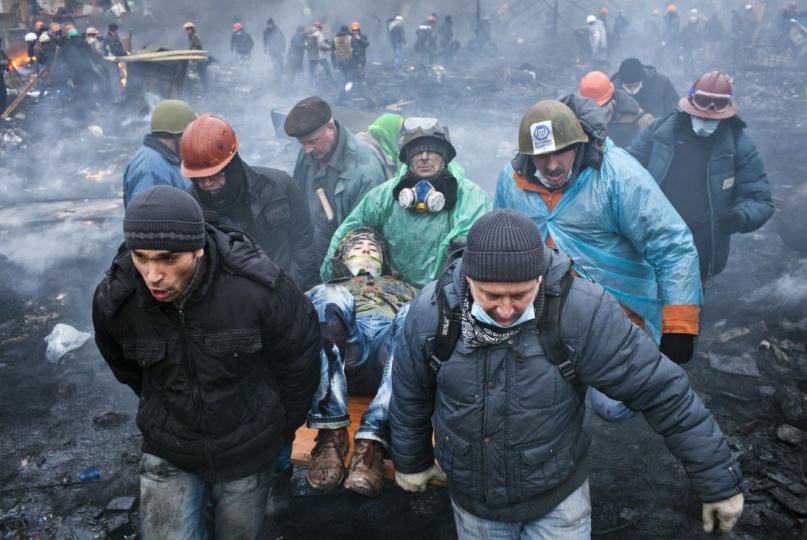
The Ukraine crisis this winter and spring continues in the east of the country with pro-Russian paramilitary groups and allegedly Russian armed forces agitating against the provisional government in Kiev, which has deployed its police and army in an attempt to suppress what it calls separatists. International diplomats continue to seek negotiated solutions, but violent clashes have resulted in more deaths. At this writing, Ukraine seems on the brink of what could become civil war, Russian invasion, or continued unrest.
Photographer Alan Chin spoke with Ziyatdinova via video conference from Kiev. The following is a lightly edited version of that conversation. Note: “Maidan” (Independence Square in Kiev) refers to both the physical location and the protest movement that began in November 2013.
Alan Chin: In February, when the first major violence happened, so many people were killed in Kiev. Let’s talk about that.
Emine Ziyatdinova: I have never wanted to go to a conflict zone or cover any kind of conflict in general, and then it just happened here. There were dead people in January as well: I wasn’t here, I was actually in Crimea, and I felt very guilty, being at my parents’ place at that point, because major things were happening [in Kiev]. I felt really guilty not only as a journalist, but also as a citizen of Ukraine because I supported Maidan and I supported these people. Then I came and worked as a fixer for awhile with Anastasia Taylor-Lind, and it was weird because there were deaths in January, but it kind of felt like a festival.
There were barricades, and there were people hanging out. It’s cold and there were people around fires and others coming to make music around the barricades. I was so troubled by what I was seeing on TV. And here I am at Maidan and there is music playing and it feels like a festival. There were a couple of memorials, but otherwise it felt like that to the end when the violence happened.
I was worried because every time they went for some kind of march, I thought, oh my God, violence is going to happen here, or something is going to start here. But I also thought that it had already passed the highest point of violence. So the day it started, Tuesday, [February 18; over a hundred people were killed by gunfire from Feb. 18 – 20] I went just to cover a couple of hours of protest, and I was going home afterwards and I didn’t think anything would happen. I got this helmet from some of the protesters just in case, and then I was stuck at Maidan for five days.
AC: You were stuck at Maidan for five days?
EZ: Yes, I went to Institutskaya Street when they tried to go to the Parliament and everyone started throwing Molotov cocktails. There were sound grenades and tear gas. And then I left and came back, and the battle was at Maidan already, and I thought, what happened? I stayed all night, and the next day I didn’t want to go back to my apartment because the subway stopped running and I thought, if I leave right now on foot, I’m not going to be able to come back. So I stayed.
At some point working with foreign journalists I felt very weird because they will leave, so it will not affect their lives in the way it affects my life.
When they started carrying bodies out of Institutskaya Street, I thought, it could be anyone I met at Maidan in these last three months. It could be my friends, because a lot of my friends were protesters. I had never in my life seen a dead body.
And then later that day I got a phone call from my university classmate Oksana: “Do you know that Bogdan was killed?” I thought, maybe I saw his body carried out of Maidan. Who knows? I knew him for so long; Oksana and I met him for the first time when we were first-year students at school. We organized some talks at university together, a lot of academic activities together. It’s really hard. I still feel very uneasy when I think about it.
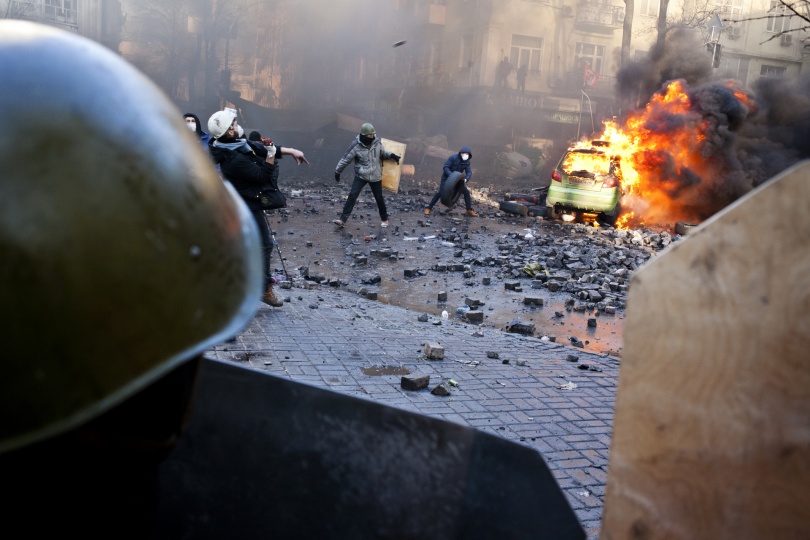
I cried a lot before that; seeing this 17-year old boy, he was dead. I don’t know his name and I didn’t know that he was 17 at the time but he looked very young. I couldn’t believe it. There were bodies lined up. I was photographing and I started crying and could not stop for awhile.
AC: After that you went back to Crimea for a month where the Russians were annexing the region. Now you just got back to Kiev. Why did you leave Crimea again?
EZ: Well, I’m done working with Danish TV, and my mom was so paranoid that I would stay in Crimea by myself. She put so much pressure on me. I’m also so tired that I decided I needed at least a week off, and to make sure that I have a place to live, at least.
AC: What do you mean that your mom was afraid of you being in Crimea alone? You were with everybody in your family and also your friends and colleagues.
EZ: I have Western Ukrainian official registration in my passport, and in Crimea, they believe that Western Ukrainians are fascists and Nazis. Also I had been at Maidan. I think my mom saw some video of me from Maidan and she was really worried that I was going to get arrested.
Partly it is just paranoia, but partly she’s right. My friends in Crimea who have been very active in Maidan, they have seen the [pro-Russian] posters around Simferopol saying that they betrayed Crimea. So I do understand why she’s worried.
Also she’s watching TV and there were some journalists kidnapped so she thinks that it’s really dangerous to be a journalist right now in Crimea. Which is partly true.
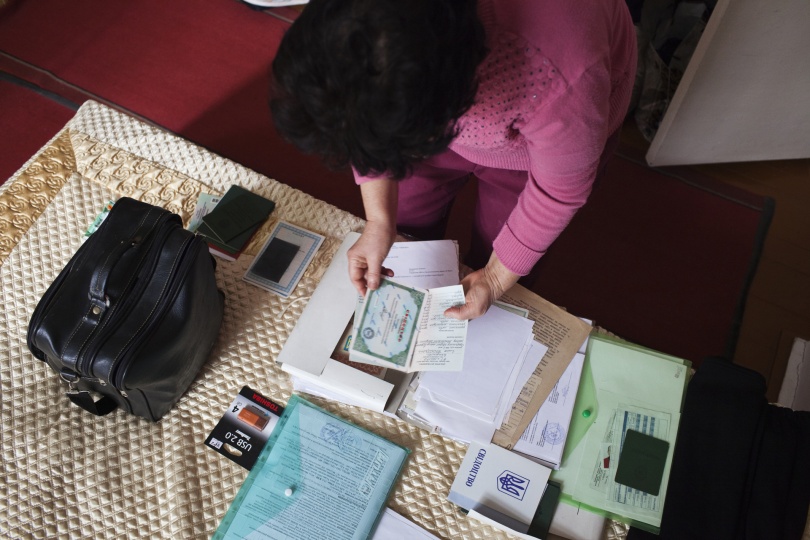
AC: So is there a division among the people you know, between people who are now more pro-Russian and those who aren’t?
EZ: Yes, of course. I know a lot of pro-Russian people as well. For example, the taxi driver we have been working with for all these last 20 days, he is the husband of my really good friend, one of my best friends, actually, from school. He is Russian and has Russian flags on his car.
AC: Does that ever come into the conversation?
We did have some kind of problem with him. We were driving to a Crimean Tatar settlement. Rustam Temirgaliyev, who is Deputy Prime Minister of the Crimean Parliament, had said that Crimean Tatars should move because they got this land illegally.
So we went there, and our driver had this Russian flag, and I said, “Misha, could you please take down this flag, because we are going to a Crimean Tatar settlement, and people will probably not be very open if we go there with a Russian flag.”
And he actually put a second flag up to make another statement. And I thought, I didn’t provoke you for a conflict or for any kind of argument, and you actually are working for us, and we are journalists.
AC: Would it be very hard to be pro-Russian in Kiev right now?
EZ: Not in Kiev in general, but at Maidan, at the center, for example.
AC: Because public opinion in Kiev was more anti-Yanukovich?
EZ: Not just Yanukovich. It was anti-government. I don’t think it was even about Europe or Russia. It’s probably been that way since December.
AC: Was it really more about the sense that the Ukrainian government has really not done its job right? If you compare Ukraine to Poland or Hungary, they’ve done a lot better since 1989 or 1991. That people feel angry that they’re not better off? That every Ukrainian government has failed and so the Maidan protest was anti-government in general?
EZ: Yanukovich and his government were really bad in the last five years because they really crossed the line through corruption and how they were taking people’s businesses. It got to the point that people are really fed up and wanting change; that was the same thing that happened in Crimea, because Crimean people also want a change.
But I don’t understand what kind of logic Crimean people trying to join Russia have. Because, here [in Kiev], even if not everyone is smart and intelligent at Maidan, ideas are more central in Kiev. People said, “We don’t stand here for politicians and we don’t stay here for opposition parties, we’re standing here for a change; we just want a change in life.”
In Crimea, they chose to become part of Russia or the Russian identity, and they brought these horrible leaders they believe in, and they love them. Sergey Aksyonov (de facto Prime Minister of Crimea) and Vladimir Konstantinov (Chairman of the Supreme Council of Crimea) were racketeers and criminals in the ‘90s and if you have been living in Crimea for the last 20 years, you would know that and most people do. They think they are going back to the Soviet Union when Crimea was a center of tourism.
They think: “Fascists and Nazis from Western Ukraine are coming, and they are going to kill us.” Well, not everyone thinks “they are going to kill us.” But they probably have never actually seen anyone from Western Ukraine. It is like a mass psychosis.
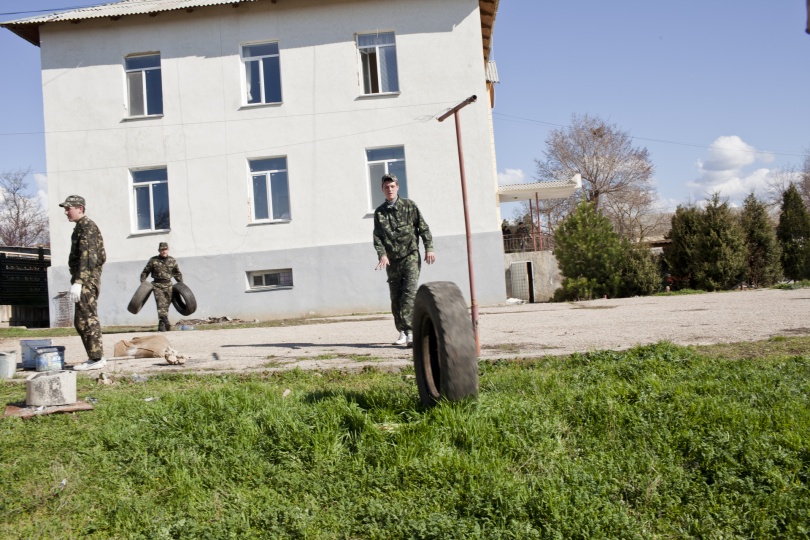
AC: What about the role of journalists?
EZ: I believe that Ukrainian journalism failed completely. Not all journalism, but TV especially, because you had 5 Kanal or Hromadske TV which were so pro Maidan and biased and you had Inter and TV Ukraine and other channels who were so pro-government and pro-Yanukovich.
And I believe this is a failure for journalism. Of course there were other ways of processing information for these people, with regards to their identity. All these parties are working in Crimea, like Russian Unity and Russian Bloc and Cossacks. And all these groups have been working pretty well in Crimea for the last 10 years, with financing from Russia.
AC: Do you think better journalism could actually have prevented this from getting so polarized?
EZ: I’m not sure, but I think good journalism and two-sided journalism would probably make people think more critically, or at least understand the other side. Because at the moment, if you go to Crimea and you talk to these [pro]-Russian people, they believe that it was the West, fascists, and Nazis at Maidan who seized power and government. I have no idea why they think about it like that because when they talk to me, they are actually talking about me.
AC: When you’re working as a journalist and you’re talking to these people, they ARE speaking about you, because you’ve lived in Kiev, you went to university in Lviv, your passport has that Western Ukraine registration. Do you feel this is more about people being poorly informed, or what is it?
EZ: It was so weird to work in Crimea. I’m a professional so I don’t expose my opinions to people we are interviewing or to people we try to talk to. When they are saying all this nonsense to you about Maidan and about all these people, it’s really hard to hold it in. I did, but at the end of the day when I got home, I felt like crying because I was holding all my emotions inside and I was smiling to these people, and I was thinking: You are talking about my friends who actually got shot by snipers over there, and you are talking about me.
Then we interviewed Halid Shuman, a business owner who is half Iraqi and half Russian, close friends with Temirgaliyev, about this Crimean Tatar settlement. I’m working with Danish TV, and of course I can’t say anything. And he was talking about Crimean Tatars and to the question, “Do you think Crimean Tatars suffered enough?” he answered, “Don’t you think Russian people suffered the same way as Crimean Tatars? Russians were sent to Siberia and Crimean Tatars were sent only to Uzbekistan – and you know about weather conditions in Siberia…"
AC: He made it a competition.
EZ: It was horrible. I really wanted to go and punch him. That was my feeling. And of course after that I just smiled and wrote down his name. And then when we got to the car and were driving, I cried. Because I held in my emotions. I hated him so much. And I thought, these people are in government in Crimea right now. And my family is there.
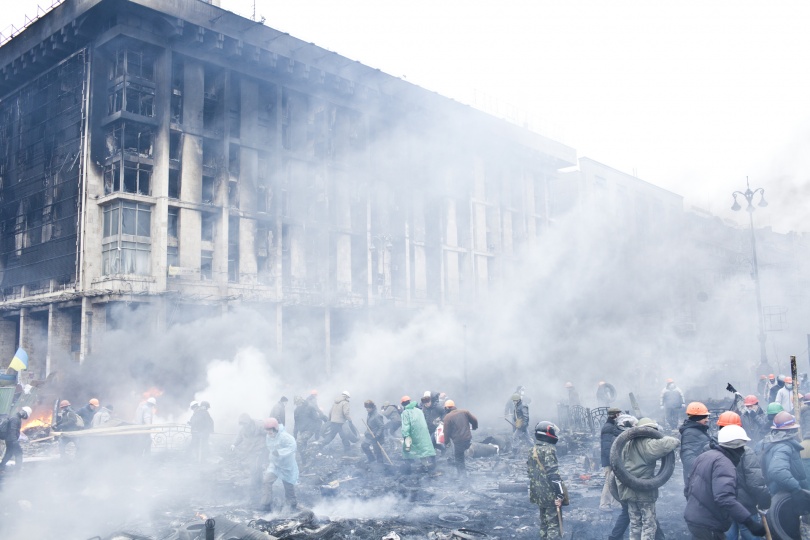
AC: How do you feel after all of that?
EZ: I feel completely emotionally drained. Today is my first day off since February 1. I just woke up and I feel deeply empty. I started reflecting on the whole thing and I can’t take it…I started cleaning the apartment.
I feel like my family is so much farther away. There is a border now, I don’t have a home to go back to, and that was the only thing that was very stable in my life in the last five years. I don’t have a family myself, I don’t have a stable job, I don’t have a place, an apartment or a house, and I don’t feel attached to any place, like Kiev or Lviv, except for Crimea, and I was always saying I would go back to Crimea when I’m older.
Crimea, like my dad and my mom, was a place to go back to and now it has been taken away. I don’t want to have a Russian passport, I’m not going to. That is the country that occupied my land so many times and fucked up my family so many times, and we are forced to get Russian passports now? It’s insane.
AC: How does being back in Kiev feel? Does Kiev feel almost normal again, or is it still different, tense?
EZ: It feels normal. Maidan feels pathetic. All of this is going on in Crimea, and they’re staying here in barricades. All of them need psychological help. They can’t leave. They put so much into it. It’s kind of crazy. I have no answers any more. I just have hopes.
AC: What are your hopes?
EZ: That Russia will not want a piece of Eastern Ukraine, and that war will not start.
AC: Do people think that will happen?
EZ: I don’t know what to believe in any more. Because there were so many points during the last four months when I thought, “No, no, no it can’t happen.” And it happened.
I have doubts that it’s going to be peaceful in Ukraine, or that it will be stable for the next five, ten years. I don’t feel like being here. I believe that I loved Ukraine, but I don’t anymore.


































































































